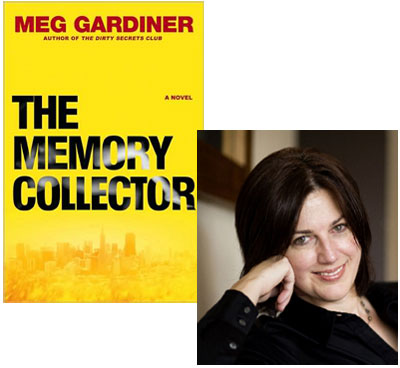Meg Gardiner: An Amnesia Plot You Won’t Forget

Like many American thriller fans, I was introduced to Meg Gardiner two years ago, when Stephen King praised her to Entertainment Weekly readers after devouring her novels, which were only available in the U.K. at that point. It didn’t take long for her to find a publisher in New York—and, in addition to publishing the backlist that got King so excited, Dutton has also launched a new series from Gardiner, the second installment of which, The Memory Collector, has just come out. You may recognize one of its initial premises, which she explains below, from the movie Memento, but you’ll soon find that she’s taking the concept in a different direction…
Jo Beckett analyzes the minds of the dead. She’s a forensic psychiatrist who performs psychological autopsies in cases of equivocal death. When the police and medical examiner can’t determine why someone has died, Jo digs through the victim’s past to ascertain whether the death was natural, accidental, suicide, or homicide. She calls herself a deadshrinker.
But in The Memory Collector Jo has a live patient. She handles the case as she would a psychological autopsy because Ian Kanan has short-term memory loss and can’t tell her what’s happened to him.
Anterograde amnesia—short-term memory loss—leaves old memories intact but destroys the ability to form new ones. Ian Kanan remembers everything about his life, right up until he suffers a brain injury. Thereafter, nothing sticks in his mind. Every few minutes, all the information he’s just gathered, all memory of his current experiences, simply fades. He can’t learn anything new. He can’t remember where he is or what he’s doing.
The idea for Kanan, the security contractor whose short-term memory has been destroyed, grew out of my brother’s true life experience working with brain-injured people. One man had short-term memory loss caused by a motorcycle crash. Every few minutes the man’s memory would evaporate. No matter how many times my brother saw him, the man always shook hands and introduced himself. At a rock concert, he continually shouted in surprise, “It’s the Grateful Dead!” The man was intelligent and personable. But he couldn’t remember from hour to hour what was going on. He didn’t even realize that he was forgetful.
So I thought: What if Jo were faced with a patient who can’t form new memories—and he’s a dangerous man? All Ian Kanan’s skills and military training, all his lethal abilities, are intact. If he disappears, planning to hunt down his enemies, could Jo track him down? If she found him, how could she stop him? Even if she convinced him to call off his vendetta, within minutes he’d forget, and pick up his gun again.
Then I thought: What if his memory loss is being caused by a contagious agent? What if he can infect others?
That was the genesis of The Memory Collector.
In some ways this book is the flip side of the first Jo Beckett novel, The Dirty Secrets Club. In that story, Jo investigates the deaths of people who have essentially been poisoned by their memories. The secrets they keep corrode their souls so badly that they choose suicide rather than face exposure. And Jo herself is trying to outrun the tragedy of her husband’s death. She changes her job and avoids people who witnessed the accident. Of course, the past catches up with her, painfully, and she’s forced to confront it.
The Memory Collector presents a contrasting scenario. Jo comes to see Ian Kanan’s amnesia as a kind of living death. Without the ability to remember new experiences, Kanan’s life is a nightmare. Jo realizes that ignorance is not bliss. Forgetfulness isn’t soothing, or a solution to the pain of living. Quite the opposite: to eradicate even painful memories is to erase oneself. It’s annihilation. Jo comes to believe that we can only live to the full by integrating the past into our daily life.
But the book is hardly a meditation on existence. It’s a thriller. Kanan is a security contractor. He may have taken part in the heist of an experimental nanotech substance. He seems bent on killing the people responsible for his injury.
And from a creative perspective, what’s catastrophic for a character and dangerous for San Francisco is great fun for an author. Kanan cobbles together a way to complete his mission without being able to remember how far he has advanced. He scribbles Post-it notes, takes cell phone photos, and writes messages all over his body. He’s wily, tough, and—though damaged—a very dangerous man.
Jo has to track him down and find out what has caused this devastating condition. And she has to find out fast, because people who were on Kanan’s flight into San Francisco begin to show the same symptoms.
When I write a novel, I like to give readers some ideas to chew on. But I love to give them a lot of action to wash those ideas down with, like a steaming pot of high-test coffee. And I want them to enjoy the whole thing, from start to finish.
10 July 2009 | guest authors |

 Our Endless and Proper Work is my new book with Belt Publishing about starting (and sticking to) a productive writing practice.
Our Endless and Proper Work is my new book with Belt Publishing about starting (and sticking to) a productive writing practice. 
